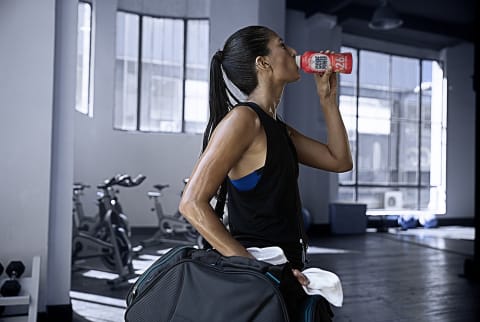Advertisement
Why Workout Recovery Is More Important Than You Think (Even If Your Idea Of Exercise Is "Running" Errands)

Strength comes in all shapes and sizes. For some, it means hoisting the heaviest barbell possible over your head, beating your best 10k time, or conquering your first pullup. But there's one more example of strength that we celebrate the most—empowerment. Whether you're launching your own business from the ground up or just trying to juggle new-mom life, there's strength in all of us.
Regardless of how you define strength for yourself, one thing remains consistent for all of us—a sound recovery routine is essential to performing at your peak. From mobility work to nutrition, recovering from life's "workouts" is a holistic endeavor that should be top-of-mind throughout your day. Here's what to keep in mind—the 4 "R's" of recovery:
Refuel.
There's a misconception that calories are a unit of measurement for food—in reality, they're actually a unit of energy, not unlike a watt or a joule. In this case, though, your body is the light bulb—and food is your fuel.
Nutrition is the foundation of any recovery routine, regardless of the activity you're recovering from. Carbohydrates are excellent at helping your body replenish its depleted stores of glycogen and boost your energy, but if you really want to recover optimally, you're going to need protein1 as well. Protein is an essential nutrient in recovery because it increases muscle protein synthesis—a fancy way of saying ""it repairs your muscles after they've been subjected to activity and makes them stronger in the process." Adequate protein intake can be tough, which is why we love quick and efficient sources like Core Power protein drinks (we're partial to their vanilla flavor). At 26 grams per bottle, keeping these RTD bottles on hand is a surefire to make sure we're refueling our bodies with the stuff it needs (whatever the day throws at us).
Replenish.
Carbs and protein aren't the only things you lose after a workout (or a particularly long day). Lest we forget—nearly 60% of your body is water. And just because you're not dripping sweat onto a gym mat doesn't mean you're not losing water throughout the day. So replacing all of these lost fluids isn't just an important part of recovery; it's an important part of, well, life.
Eight glasses per day seems to be the gold standard, and while it's a reasonable goal to shoot for, it's not entirely necessary for the average person (unless you had a particularly tough workout, are pregnant, or are simply sweating more than usual on a hot day). Lucky for us (and you!), drinks like Core Power are an efficient way to get protein AND feel refreshed in one swig (OK, a few swigs).
Shop this story:
Revive.
We get it, the last thing you want to do after a brutal workout (or an equally brutal day running around town) is to exercise more. But hear us out—staying active throughout your day will pay off in the long run.
Don't be fooled, though—we're not talking about a second workout (please no). Active recovery2 is all about keeping your body moving to prevent it from feeling tight or sore. Whether it's taking a leisurely walk, foam rolling, or mobility work, keeping your muscles activated on a consistent basis can have profound benefits. Not only will it prevent soreness, but these simple techniques can also help increase your blood flow, eliminate toxins, and reduce the buildup of the much-dreaded lactic acid.
Relax.
On the flip side of (and nearly as important as) active recovery, you have passive recovery. This is just what it sounds like—giving your body the break it needs to recharge at its own pace. Passive recovery is essentially everything you do throughout your day that doesn't involve movement (so, most of your time).
As mentioned, recovery is an all-day endeavor. Letting your body come to rest (especially when you're asleep) is one of the best ways to avoid injury, recharge your energy, and let your muscles heal. If you ask us, too much emphasis is put on those precious moments directly following a workout. Your body is repairing itself all day and night, so make sure you're spacing your meals out. We love that Core Power is a complete source of protein, which means it helps our muscles repair themselves all day long. We enjoy ending our days with their chocolate flavor because it reminds us of the chocolate milk we grew up on (just updated for our present-day wellness routine).


